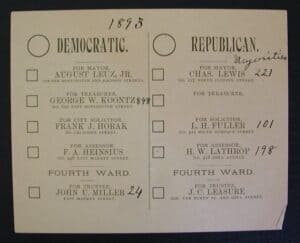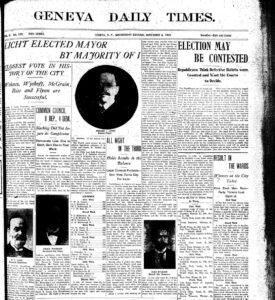Geneva’s Close Election of 1903
By Anne Dealy, Director of Education and Public Information
(From the November 2006 Historical Society Newsletter)
The 2000 presidential election made all Americans aware of the power of a handful of votes in the right precincts. Since then, concern about electoral procedures, voting machines, and redistricting have kept the matter in our minds in and out of elections season. With Election Day just around the corner, we thought we would look back at Geneva’s controversial mayoral election of 1903.
At that time, the Democrat George E. Licht faced Republican Albert Herendeen in the contest for mayor. Licht was the head of Patent Cereals, while Herendeen ran a nursery business. Licht had served on the fire commission and Herendeen had previously served two terms as mayor from 1897-1901. In a period of statewide political corruption, both candidates proclaimed themselves advocates of good government and efficiency. Important local issues were beautifying the lakefront, paving the streets, improving the sewers, and purchasing fire fighting equipment.

Australian ballot from an 1893 Iowa City municipal election. According to election rules, the voter’s mark had to be inside the square or circle on the ballot. Mismarked ballots caused some controversy in the 1903 Geneva election. From https://homepage.cs.uiowa.edu/~jones/voting/pictures/.
In 1903 American men cast their votes with paper ballots. Geneva voters probably used the “Australian ballot” introduced to New York State in 1890. This was a paper ballot, preprinted with the candidates’ names and party affiliation and distributed by the government. Previously voters wrote in the name of their choice on a ballot or used ballots printed and distributed by the political parties. This made stuffing the ballot box easy; they simply dropped multiple ballots when they voted. Because only one ballot was issued to each voter under the Australian system, fraud was better controlled. The problem with the Geneva ballots was that some voters had marked outside the designated box and inspectors disagreed over whether such votes were valid.
According to the Wednesday evening Geneva Daily Times of November 4, 1903 the final vote in the election was 1294 for Licht and 1293 for Herendeen. The morning’s paper had announced that the election had ended in a tie, but careful examination of the ballots allowed Licht to pull ahead. The election inspectors spent all night disputing the validity of some ballots and recounting them. During the recount an additional ballot for Licht was found and the results announced at 9 a.m.
The Republicans considered contesting the election and demanding a recount from the state supreme court. Unfortunately for the party, Herendeen decided against contesting the election and conceded defeat on Thursday, stating: “Twice have I been through a mayoral term and I know that it is a thankless task. It means a lot of gratuitous work for the city for which you receive nothing in return….Therefore, as far as I am concerned, I will concede the election to Mr. Licht.” Apparently, even then the rewards of public service were limited.
The same day, the Times ran an article indicating that Genevans favored voting machines, which counted faster and more accurately. One citizen stated: “If machines had been in use in Geneva Tuesday, there would not have been the possibility for any contested election. The new and improved machines prevent an elector from making these bungling mistakes that are causing all this trouble over the court of the votes.” Geneva would institute voting machines a few years later in 1908.
Sometimes studying history just proves that everything old is new again.…especially in politics.


Ann A great and informative article. I wish we were still using the old voting machines.
Me too. Although most were so old and worn out that I understand they weren’t reliable any more either.
This is a very timely article as the election of 2020 “continues” into its 8th (?) day… very interesting perspective… I, too, wish we had the old machines… there was a romantic kind of nuance to them in terms of sight and sound and mechanical “beauty” when the lever was pulled… miss them, too…